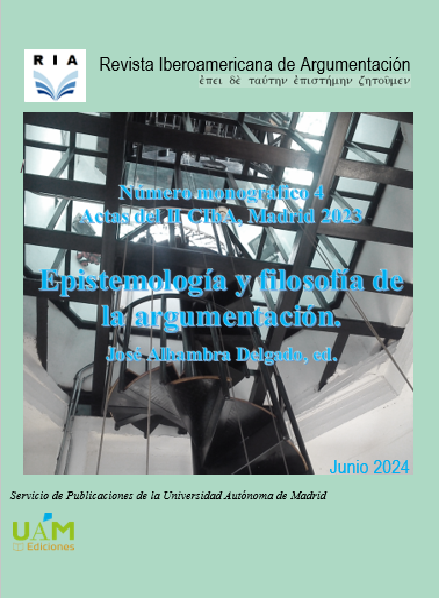Keywords:
Dung, formal argumentation, instantiations, abstract frameworks, structured frameworks, incomplete argumentation frameworks, frameworks with uncertainty, structured systemsCopyright (c) 2024 Revista Iberoamericana de Argumentación

This work is licensed under a Creative Commons Attribution-NonCommercial-NoDerivatives 4.0 International License.
Abstract
This papers studies different options for the instantiation of incomplete abstract argumentation frameworks into ASPIC+. The main motivation of the work is rooted in general arguments that point out the danger of unlimited abstraction in argumentation models research and the need to study some instantiations in order to avoid ad-hoc modelling of examples and implicit assumptions behind abstract models. The work has a conceptual focus, showing how some assumptions underlying incomplete abstract argumentation frameworks are not exactly true when some of its instances are considered in detail.
Downloads
References
Baumeister, D., Järvisalo, M., Neugebauer, D., Niskanen, A., & Rothe, J. (2021). “Acceptance in incomplete argumentation frameworks”. Artificial Intelligence, 295, 103470.
Baroni, P., Gabbay, D., Giacomin, M., & Van der Torre, L. (2018). Handbook of formal argumentation (volume 1). College Publications.
Bench-Capon, T. J., & Dunne, P. E. (2007). “Argumentation in artificial intelligence.” Artificial intelligence, 171(10-15), 619-641.
Cohen, A., Parsons, S., Sklar, E. I., & McBurney, P. (2018). “A characterization of types of support between structured arguments and their relationship with support in abstract argumentation”. International Journal of Approximate Reasoning, 94, 76-104.
Dung, P. M. (1995). “On the acceptability of arguments and its fundamental role in nonmonotonic reasoning, logic programming and n-person games”. Artificial intelligence, 77(2), 321-357.
Gabbay, D., Giacomin, M., Simari, G. R. & Thimm, M. (2021). Handbook of formal argumentation (volume 2). College Publications.
Fagin, R., & Halpern, J. Y. (1987). “Belief, awareness, and limited reasoning”. Artificial intelligence, 34(1), 39-76.
Mailly, J. G. (2022). “Yes, no, maybe, I don’t know: Complexity and application of abstract argumentation with incomplete knowledge”. Argument & Computation, 13(3), 291-324.
Marraud, H. (2017). “De las siete maneras de contraargumentar”. Quadripartita ratio, (4), 52-57.
Modgil, S., & Prakken, H. (2013). “A general account of argumentation with preferences”. Artificial Intelligence, 195, 361-397.
Modgil, S., & Prak ken, H. (2014). “The ASPIC+ framework for structured argumentation: a tutorial”. Argument & Computation, 5(1), 31-62.
Odekerken, D., Lehtonen, T., Borg, A., Wallner, J. P., & Järvisalo, M. (2023). “Argumentative reasoning in ASPIC+ under incomplete information”. En: P. Marquis, T. Cao Son, G. Kern-Isberner (Eds.), Proceedings of the International Conference on Principles of Knowledge Representation and Reasoning (Vol. 19, No. 1, pp. 531-541). IJCAI Organization.
Prakken, H. (2017). “Historical overview of formal argumentation”. IfCoLog Journal of Logics and their Applications, 4(8), 2183-2262.
Prakken, H., & De Winter, M. (2018). “Abstraction in Argumentation: Necessary but Dangerous”. En: S. Modgil, K. Budzynska, J. Lawrence (Eds.), Computational Models of Argument (pp. 85-96). IOS Press.
Yuste-Ginel, A., & Herzig, A. (2023). “Qualitative uncertainty and dynamics of argumentation through dynamic logic”. Journal of Logic and Computation, 33(2), 370-405.
Yuste-Ginel, A., & Proietti, C. (2023). “On the instantiation of argument-incomplete argumentation frameworks”. En: G. Alfano y S. Ferilli (Eds.) AI^3 2023 7th Workshop on Advances in Argumentation in Artificial Intelligence. CEUR.
